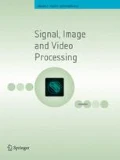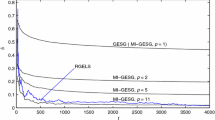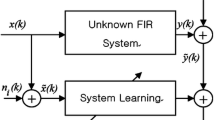Abstract
A stochastic convergence analysis of the parameter vector estimation obtained by the recursive successive over-relaxation (RSOR) algorithm is performed in mean sense and mean-square sense. Also, excess of mean-square error and misadjustment analysis of the RSOR algorithm is presented. These results are verified by ensemble-averaged computer simulations. Furthermore, the performance of the RSOR algorithm is examined using a system identification example and compared with other widely used adaptive algorithms. Computer simulations show that the RSOR algorithm has better convergence rate than the widely used gradient-based algorithms and gives comparable results obtained by the recursive least-squares RLS algorithm.




Similar content being viewed by others
References
Widrow, B., Stearns, S.D.: Adaptive Signal Processing. Prentice Hall, Englewood Cliffs (1985)
Nagumo, J.I., Noda, A.: A learning method for system identification. IEEE Trans. Autom. Control 12(3), 282–287 (1967)
Ozeki, K., Umeda, T.: An adaptive filtering algorithm using an orthogonal projection to an affine subspace and its properties. Electron. Commun. Jpn. 67–A(5), 19–27 (1984)
Haykin, S.: Adaptive Filter Theory, 5th edn. Prentice Hall, Upper Saddle River (2013)
Diniz, P.S.R.: Adaptive Filtering: Algorithms and Practical Implementation, 4th edn. Springer, New York (2013)
Koçal, O.H.: A new approach to least-squares adaptive filtering. In: Proceedings of IEEE International Symposium on Circuits and Systems (ISCAS’98), Monterey, California, USA, vol. 5, 31 May–3 June 1998, pp. 261–264
Xu, G.F., Bose, T., Schroeder, J.: Channel equalization using an Euclidean direction search based adaptive algorithm. In: Proceedings of Global Telecommunication Conference (GLOBECOM 1998), Sydney, NSW, vol. 6, 8–12 Nov. 1998, pp. 3479–3484
Mathurasai, T., Bose, T., Etter, D.M.: Decision feedback equalization using an Euclidean direction based adaptive algorithm. In: Proceedings of 33th Asilomar Conference on Signals, Systems, and Computers, Pacific Grove, CA, USA, vol. 1, 24–27 Oct. 1999, pp. 519–523
Xu, G.F., Bose, T., Kober, W., Thomas, J., Fast, A.: Adaptive algorithm for image restoration. IEEE Trans. Circuits Syst. I Fundam. Theory Appl. 46(1), 216–220 (1999)
Bose, T., Xu, G.F.: The Euclidean direction search algorithm in adaptive filtering. IEICE Trans. Fundam. Electron. Commun. Comput. Sci. E85–A(3), 532–539 (2002)
Li, C., Liao, X., Yu, J.: A fast complex-valued adaptive filtering algorithm. Int. J. Gen. Syst. 31(4), 395–403 (2002)
Mabey, G.W., Gunther, J., Bose, T.: A Euclidean direction based algorithm for blind source separation using a natural gradient. In: Proceedings of IEEE International Conference on Acoustics, Speech and Signal Processing (ICASSP’04), vol. 5, 17–21 May 2004, pp. 561–564
Zhao, C., Abeysekara, S.S.: Investigation of Euclidean direction search based Laguerre adaptive filter for system identification. In: Proceedings of the International Conference on Communications, Circuits and Systems, vol. 2, 27–30 May 2005, pp. 691–695
Ahmad, N.A.: Accelerated Euclidean direction search algorithm and related relaxation schemes for solving adaptive filtering problem. In: Proceedings of the 6th International Conference on Information, Communications and Signal Processing (ICICS 2007), Singapore, 10–13 Dec. 2007, pp. 1–5
Zhang, Z., Bose, T., Gunther, J.: A unified framework for least square and mean square based adaptive filtering algorithms. In: Proceedings of IEEE International Symposium on Circuits and Systems (ISCAS 2005), vol. 5, 23–26 May 2005, pp. 4325–4328
Hatun, M., Koçal, O.H.: Recursive Gauss–Seidel algorithm for direct self-tuning control. Int. J. Adapt. Control Signal Process. 26(5), 435–450 (2012)
Hatun, M., Koçal, O.H.: Recursive successive over-relaxation algorithm for adaptive filtering. In: Proceedings of Mosharaka International Conference on Communications, Computers and Applications (MIC-CCA 2012), İstanbul, Turkey, 12–14 Oct. 2012, pp. 90–95
Golub, G.H., Van Loan, C.F.: Matrix Computations, 3rd edn. John Hopkins University Press, Baltimore (1996)
Ahmad, M.S., Kukrer, O., Hocanin, A.: Recursive inverse adaptive filtering algorithm. Digit. Signal Process. 21(4), 491–496 (2011)
Ahmad, M.S., Kukrer, O., Hocanin, A.: A 2-D recursive inverse adaptive algorithm. Signal Image Video Process. 7(2), 221–226 (2013)
Johnson Jr., C.R.: Lectures on Adaptive Parameter Estimation. Prentice Hall, Englewood Cliffs (1988)
Author information
Authors and Affiliations
Corresponding author
Rights and permissions
About this article
Cite this article
Hatun, M., Koçal, O.H. Stochastic convergence analysis of recursive successive over-relaxation algorithm in adaptive filtering. SIViP 11, 137–144 (2017). https://doi.org/10.1007/s11760-016-0912-7
Received:
Revised:
Accepted:
Published:
Issue Date:
DOI: https://doi.org/10.1007/s11760-016-0912-7




